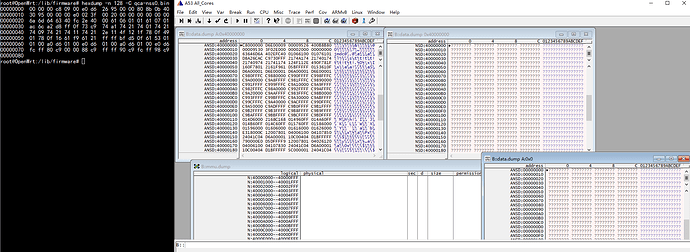Hi,
I have a sample with 1GB RAM. I want to know its physical memory address range. I checked memory node of device tree. Does it mean the address range is 0x0--0x3f ff ff ff?
root@OpenWRT:/sys/firmware/devicetree/base/memory# hexdump -C reg
00000000 00 00 00 00 40 00 00 00 00 00 00 00 40 00 00 00 |....@.......@...|
00000010
If so, it seems not make sense. According to its dts file [1], node "reserved-memory" shows the physical memory address from 0x40000000. How do I understand this? Thank you!
reserved-memory {
#ifdef __IPQ_MEM_PROFILE_256_MB__
......
......
#else
/* 512MB/1GB Profiles
* +==========+==============+=========================+
* | | | |
* | Region | Start Offset | Size |
* | | | |
* +----------+--------------+-------------------------+
* | NSS | 0x40000000 | 16MB |
* +----------+--------------+-------------------------+
* | Linux | 0x41000000 | Depends on total memory |
* +----------+--------------+-------------------------+
* | uboot | 0x4A600000 | 4MB |
* +----------+--------------+-------------------------+
* | SBL | 0x4AA00000 | 1MB |
* +----------+--------------+-------------------------+
* | smem | 0x4AB00000 | 1MB |
* +----------+--------------+-------------------------+
* | TZ | 0x4AC00000 | 4MB |
* +----------+--------------+-------------------------+
* | Q6 | | |
* | code/ | 0x4B000000 | 20MB |
* | data | | |
* +----------+--------------+-------------------------+
* | IPQ5018 | | |
* | data | 0x4C400000 | 14MB |
* +----------+--------------+-------------------------+
* | IPQ5018 | | |
* | M3 Dump | 0x4D200000 | 1MB |
* +----------+--------------+-------------------------+
* | IPQ5018 | | |
* | QDSS | 0x4D300000 | 1MB |
* +----------+--------------+-------------------------+
* | IPQ5018 | | |
* | Caldb | 0x4D400000 | 2MB |
* +----------+--------------+-------------------------+
* | QCN6122_1| | |
* | data | 0x4D600000 | 16MB |
* +----------+--------------+-------------------------+
* | QCN6122_1| | |
* | M3 Dump | 0x4E600000 | 1MB |
* +----------+--------------+-------------------------+
* | QCN6122_1| | |
* | QDSS | 0x4E700000 | 1MB |
* +----------+--------------+-------------------------+
* | QCN6122_1| | |
* | Caldb | 0x4E800000 | 5MB |
* +----------+--------------+-------------------------+
* | QCN6122_2| | |
* | data | 0x4ED00000 | 16MB |
* +----------+--------------+-------------------------+
* | QCN6122_2| | |
* | M3 Dump | 0x4FD00000 | 1MB |
* +----------+--------------+-------------------------+
* | QCN6122_2| | |
* | QDSS | 0x4FE00000 | 1MB |
* +----------+--------------+-------------------------+
* | QCN6122_2| | |
* | Caldb | 0x4FF00000 | 5MB |
* +----------+--------------+-------------------------+
* | |
* | Rest of the memory for Linux |
* | |
* +===================================================+
*/
q6_mem_regions: q6_mem_regions@4B000000 {
no-map;
reg = <0x0 0x4B000000 0x0 0x5400000>;
};
q6_code_data: q6_code_data@4B000000 {
no-map;
reg = <0x0 0x4B000000 0x0 01400000>;
};

 Thanks.
Thanks.